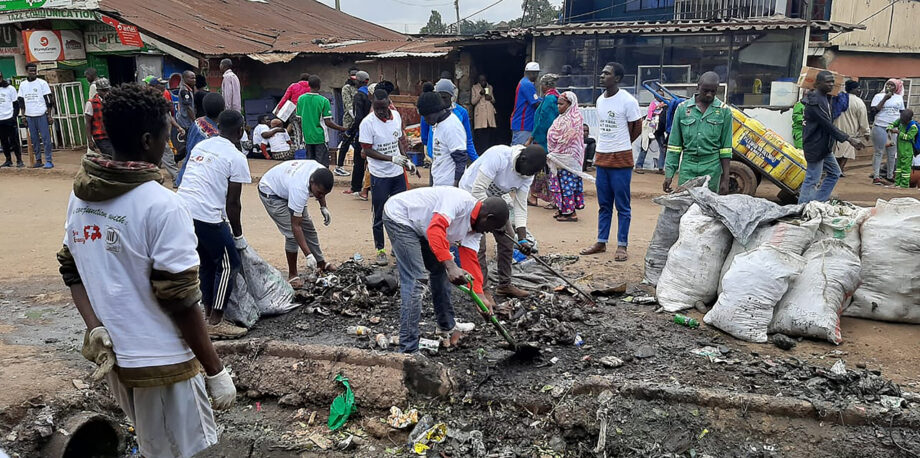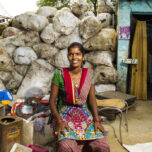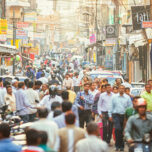July 16, 2020 — The trash-lined spaces between crowded shacks don’t make for the best playgrounds for children, but they’re what’s available for the residents of Kibera, Africa’s largest urban informal community in Nairobi, Kenya. On any given day, a group of youngsters can be seen chasing after a homemade soccer ball in a clearing surrounded by garbage. When one of them lobs the ball too hard and sends it flying into a trash mound, another will fish the ball out barefoot, reaching for it with bare hands, oblivious to environmental contaminants and diseases.
This is one of many images that haunts Alfy Ayoro, a 29-year old university student and Kiberan native. Like his neighbors, he constantly grapples with the risks of typhoid and cholera, illnesses that arise from poor sanitation or contaminated water sources.
Although Ayoro has lived in Kibera all his life, he knows that what is common here isn’t normal in much of the rest of the world.
In 2017, along with his childhood friend Yajub Jaffar, Ayoro founded Kibra Green, a grassroots organization aimed at cleaning up the neighborhood by mobilizing young people. Despite the lack of steady funding, the organization has made a difference. Kibra Green’s ongoing efforts spotlight an extraordinary initiative of youths to improve the environment in their community despite steep socioeconomic barriers.
Saturday Sweep
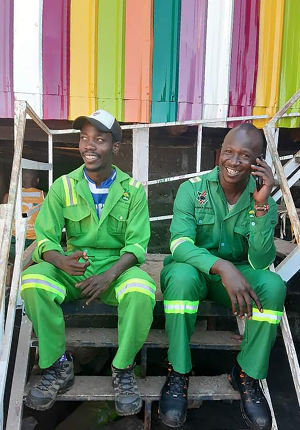
Childhood friends Yajub Jaffar and Alfy Ayoro founded Kibra Green in 2017 as a way to engage youth in cleaning up their community. Photo courtesy of Kibra Green
The locals have a Swahili saying, “Nguvu ya vijana tegemeo la jamii” — “youths are the cornerstone of society, on whom a nation’s future lies.” The founding of Kibra Green is a testament to Ayoro’s belief in that statement.
In Kibera, the government owns all of the land. That means almost all Kiberans are officially squatters, and the government does not provide basic services such as roads and sanitation.
One of Kibra Green’s goals is to mitigate the environmental impacts of the lack of an official waste management system. Currently, households dump their garbage in any available corner. Some residents are known to defecate into plastic bags and fling them out of the house, leading to the practice called “flying toilets.” Kibera generates an estimated average of 205 metric tons (226 tons) of trash per day. Without an organized waste collection effort, half of the trash ends up in heaps in public spaces — an eyesore and a menace to public health.
Several enterprising youth groups collect garbage door-to-door for a small fee, but their efforts are scattered. Kibra Green looks to consolidate those efforts for greater impact.
“If [we] work as a unit, we are strong. But if you are a small unit operating within a small area, [collectively] we are very weak,” Ayoro says he told members of these youth groups in a bid for their participation in Kibra Green’s activities. Ayoro recruits new members through social media, by giving public talks and — on occasion — by approaching youths on the street.
Ayoro proved to be convincing. Nearly every Saturday, Kibra Green leads a communitywide clean-up. Participants, as many as 500 at a time, include members of youth soccer clubs and women. Many of them dressed in eye-catching green overalls funded by donations, they comb through the streets and drains armed with trash bags, rakes and brooms.
The recyclables are brought to dealers, fetching US$1 for every 40 pounds (18 kilograms) of plastic, according to Ayoro. Some of the money is split among the participants that day, and the rest is injected back into the organization. The remaining garbage is sent to government-designated temporary dumpsites, where a county trash collector picks it up anywhere between once every few days and once a month. At the end of the day, when participants gather to celebrate the successful clean-up, event leaders take the opportunity to discuss proper trash disposal practices and discourage the use of plastic disposables.
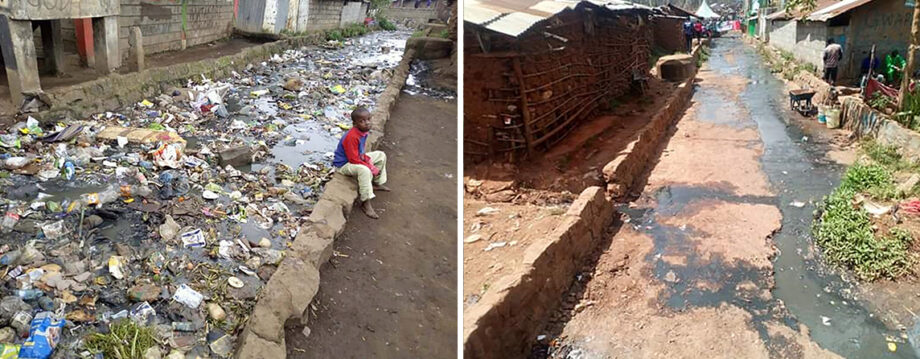
The grassroots organization Kibra Green aims to clean up the neighborhoods in Kibera by mobilizing young people. The risks of trash piling up in streets include typhoid and cholera, illnesses that arise from poor sanitation or contaminated water sources. Photo courtesy of Kibra Green
A United Nations Environment Program intern in Nairobi, Vinita Ganesh served as a volunteer consultant to Kibra Green in 2018. She recounts that in one of the drainage ditches leading to the Nairobi River, water started flowing for the first time since anyone could remember. Previously, the ditch was clogged with solid waste. When a murky trickle flowed one September morning, residents cheered and clapped.
“A bunch of kids [were tracing] the head of the water flow, trying to catch up with it,” says Ganesh. “We were all moved.”
More Than Waste Collection
The challenges Kibra Green faces are piled higher than Kibera’s extensive garbage. Extreme poverty and a precarious gig economy often take priority over the organization’s environmental efforts and make it hard for young people to commit, especially for an extended period of time. Many of Kibera’s hundreds of thousands of residents subsist on less than a dollar a day. Half of them are unemployed. It’s difficult to expect Kibera’s residents to be inspired toward environmentalism when they’re necessarily preoccupied with getting by from day to day.
Understanding this reality, Kibra Green leaders also offered training in vocational skills when funding was available — enticing youngsters to join the organization while simultaneously addressing some of Kibera’s social issues. Volunteers ran training sessions on welding and metal fabrication every day of the week. In return, the trainees participated in Kibra Green’s trash collection, tree planting and other environmental efforts.
Over the years, Kibra Green has evolved to be more than just an environmental organization. It has given many youth members a purpose, empowering them to take pride in their homes, to go above and beyond their civic duties. Participants come for the environmental cause, but those who remain with Kibra Green stay for their sense of belonging with the organization.
Hadija Maulid Abdallah is a relatively new member who was inspired by cofounder Jaffar’s speech at a school event. After graduating from high school in November 2019, she had more time on her hands to volunteer with Kibra Green, and vows to “[keep volunteering] until her last breath.” Her favorite aspect of Kibra Green is its sense of community.
“Kibra Green is more like a family,” says Abdallah. “We have people from different backgrounds, with different surnames, from different tribes, but once you wear the overall of Kibra Green, these things are pushed away.”
Pandemic Support
Since March, Kibra Green has taken on an additional function of mitigating the spread of Covid-19. In the same entrepreneurial spirit, the organization has reached out to UN-Habitat for help in addressing Kibera’s inadequate water sanitation, a dangerous problem in the face of a raging coronavirus. Kibra Green is one of dozens of organizations that have partnered with UN-Habitat to run handwashing stations across the community.
The total number of Covid-19 cases has soared in Kenya. The infection rate solely within Kibera is unclear, but residents like Abdallah feel that the virus spreading could have been much worse.
Doug Ragan, a program management officer with UN-Habitat, commends the youth groups for their proactive service in limiting the spread of Covid-19. UN-Habitat aims to increase the capacity of these groups to carry out any project around sustainable urbanization. UN-Habitat has worked closely with Kibra Green ever since the onset of the pandemic and has occasionally sponsored a clean-up event in the past.
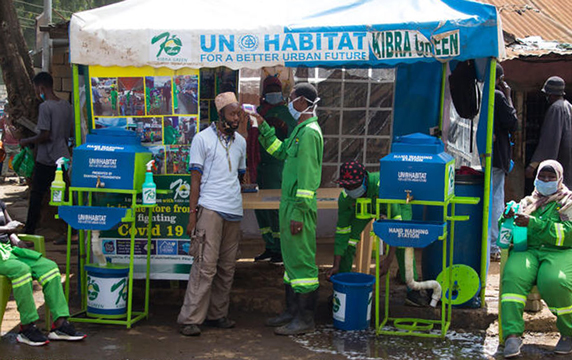
In addition to its usual work in Kibera, Kibra Green has responded to Covid-19 by partnering with UN-Habitat to help mitigate the spread of the virus. Photo courtesy of Kibra Green | The King’s Eye Photography
“[We aim to] engage and increase the capacity of the youth groups, because they can provide a huge amount of support to [governmental] services that are very weak within these informal settlements,” says Ragan. He says he is in awe of Kibra Green’s ability to galvanize the community towards a common cause. “[Kibra Green] would be in the top groups that I’ve worked with in terms of their ability to organize themselves.”
Even despite the pandemic, Kibra Green is still regularly organizing clean-ups and running its vocational classes, but with reduced attendance to comply with social distancing guidelines.
“We can’t stop everything because of Covid,” says Ayoro. “Only a day is enough for garbage to pile up if not checked.”
Hardy Optimism
Ayoro’s hope is to create a financially sustainable organization and to pay its staffers. Right now, all the members contribute without the expectation of any financial compensation. Still, their impact on the community is significant — both in terms of environmental services and in the potential for long-term benefit in the form of youth engagement in environmental and social issues.
“I think what Covid has taught us is that things are exponential. What Kibra Green is doing right now is, in the larger scope of things, quite small,” says Ragan. “But if they do it really well, other people pick up on [this civic-mindedness] and it becomes exponential.”
Ayoro agrees. With the rise of social media and increasing internet accessibility, he says, young people in Kibera are becoming more aware of the avenues to make a difference in their community and are eager to join the bandwagon.
“The way Kibera was 10 years ago — it’s totally different [now],” says Ayoro. “I think Kibera won’t be the way it is in the next few years … I’m really optimistic.”
Editor’s note: This piece was produced in collaboration with the NPR Scicommers.
Related Posts
Ensia shares solutions-focused stories free of charge through our online magazine and partner media. That means audiences around the world have ready access to stories that can — and do — help them shape a better future. If you value our work, please show your support today.
Yes, I'll support Ensia!